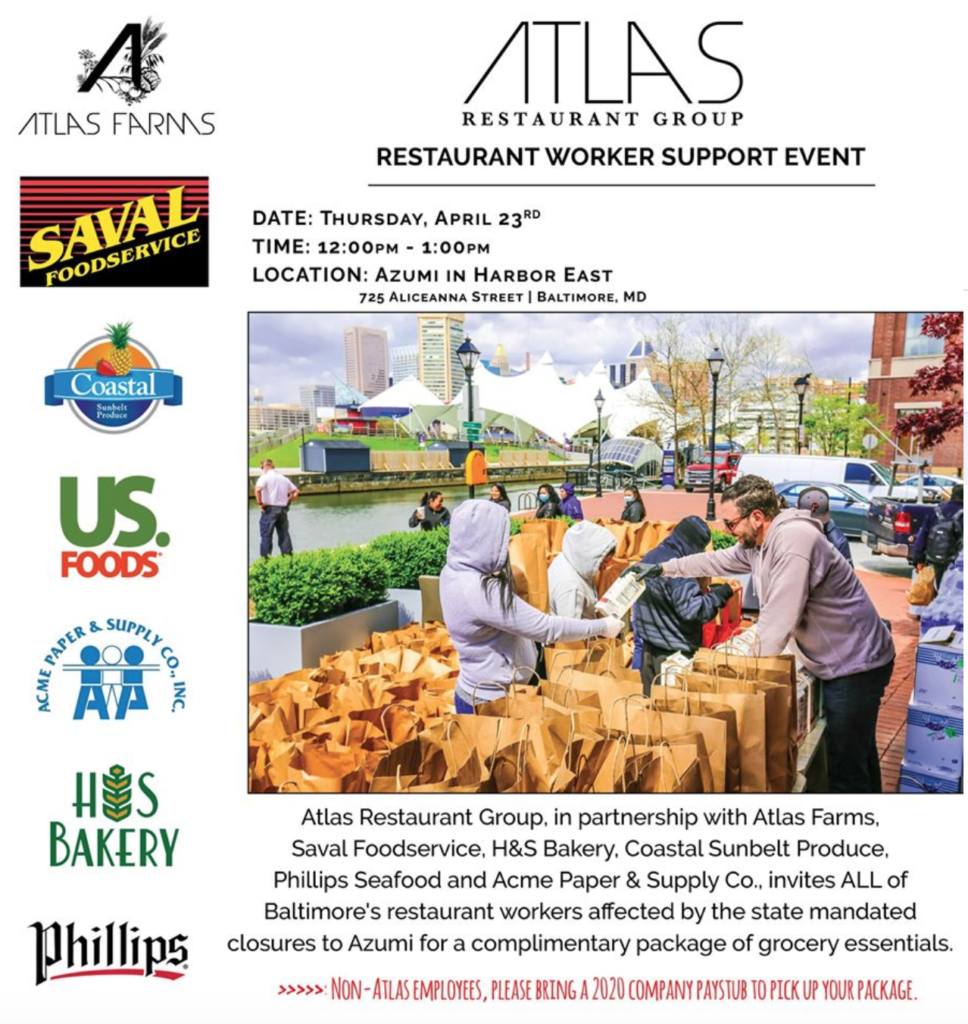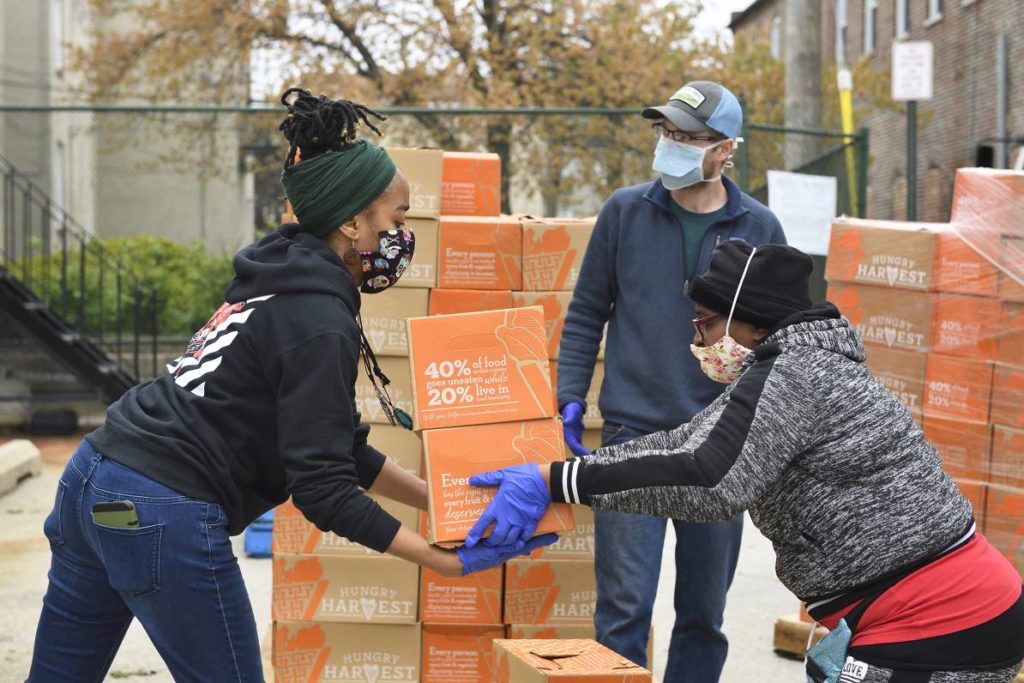COVID-19 Customer Spotlight: Saval Foods Corporation
In the midst of a pandemic, many companies are electing to help their customers and communities make it through. Our client, Saval Foods Corporation, shares their inspiring story of how the coronavirus altered their business model, and how they adapted in order to save both their company and their community.
Seven weeks ago, Baltimore-based Saval Foods Corporation was on track for a record year. Overnight, everything changed.
In March, states began to shut down, spurring businesses to switch to remote work, lay off employees, or close their doors for good. While many companies were able to suspend payments and services, the agricultural sector and all affiliated businesses, didn’t have this luxury.
“We were devastated by the economic shutdown in the Mid-Atlantic,” said Paul Saval (as in “travel”), Owner of Saval Foods Corporation. “Most of our business is selling restaurants food and food-related products. One week things were going great, and the next day we pretty much felt like we were done.”
According to Saval, the foodservice industry is the backbone of the American economy. They feed America, distributing more than 8.7 billion cases of food and food-related products annually, as well as employing more than 350,000 people.
With almost 65% of its business practically gone overnight, and enormous amounts of perishable inventory that might not be able to be sold, Saval Foods had to alter their business model or risk shutting the doors forever.
Saval credits his son, Vice President Brian Saval, for his creative problem solving in helping to pivot the company to adapt to these unprecedented changes.
It was during St. Patrick’s Day week, one of the busiest times of the year for Saval Foods—a distributor and manufacturer of deli meats including corned beef—that they began to gain traction in the community for their response to COVID-19.
“We decided that we were going to have St. Patrick’s Day in the parking lot of one of our customers, the Stained Glass Pub,” said Saval. “We gave away free corned beef sandwiches to anyone who would drive by.”
With the press coverage they received from their St. Patrick’s Day event, Saval Foods decided to continue on that track. They worked with one of their customers to provide food to unemployed restaurant workers in Baltimore City.
“We served over 300 bags of product to unemployed workers, basically two weeks’ worth of food, chicken, bread, and other things they could use,” said Saval.
From there, Saval Foods began serving other local communities including Arlington, Virginia, Washington D.C., and Ellicott City, Maryland. And people began to take notice.
“We started getting calls from other nonprofits who were feeding or trying to feed people and they were trying to source food,” said Saval.
Among the nonprofits Saval Foods partnered with are Food & Friends in Washington DC, the Maryland Food Bank, Johns Hopkins Hospital, Backyard Baltimore, Atlas Restaurant Group, Bread, and Meals on Wheels.
Saval has also opened his warehouse to unemployed and laid off workers so they can pick up food every week in addition to offering curbside pickup as an alternative to the grocery store.
With their curbside pickup model, customers can “sit in their car, call that they’re here, and we will bring it out to the curbside and give them whatever they ordered,” said Saval.
Saval Foods also has a meat manufacturing subsidiary, Deli Brands America. Deli Brands has been fortunate in its adjustment to COVID-19 so far, but “other [manufacturing plants] across the country that are much larger than us, who have hundreds and thousands of employees, the big meat packers, they can’t do social distancing,” said Saval.
As more employees in larger processing plants become infected with COVID-19 there are not enough workers to keep the operations running smoothly, and many plants are closing their doors. The effects? Unprecedented.
Not only have there been mass slaughters at many meat processing plants, but according to Saval, “the prices on products have just skyrocketed.”
In a full page ad in the New York Times, John Tyson, Chairman of the Board for meat processing giant Tyson Foods wrote, “As pork, beef and chicken plants are being forced to close, even for short periods of time, millions of pounds of meat will disappear from the supply chain.”
On April 23, 2020, beef prices were up almost 20% and could continue to climb as meat shortages start to affect grocery stores across the U.S.
While this directly impacts individual consumers, it will also take its toll on restaurants as the U.S. prepares to open back up in the coming weeks.
“When it rains it pours,” said Saval, “obviously our distribution business will be impacted and our customers will be impacted and now that the Mid Atlantic is beginning to open up—Virginia opens up next week—the restaurants are going to have sticker shock because the products that they bought eight weeks ago are now costing two, three, four dollars more per pound, and they may not be able to get them they might have to use an alternative.”
While several governmental relief programs are in place to help these restaurants, including the forgivable PPP loans, Saval fears it may not be enough.
“Restaurants are required to spend 75% of the funds on payroll to gain loan forgiveness,” writes Saval in an Op-ed he submitted to several newspapers. “If they aren’t open, or open to full capacity, how can they be expected to support a payroll to gain loan forgiveness? At the very least, this requirement should be changed to 50 percent so restaurants can use these funds to pay for the food and supplies needed to open their doors for both their customers and employees.”
While there is a lot up in the air about how reopening the United States will look like in the coming weeks, there’s no question that it needs to happen. Though nonprofits and companies like Saval Foods Corporation have stepped up and led the charge in feeding their impacted communities, it will be a long uphill battle to return to normalcy.
For now, Saval Foods Corporation has begun to reopen its processing plants, but this time with a new model. They now package food and meal boxes for members of their communities. Their plant has rehired all its workers, with plans to continue to rehire as their business picks back up.
“We’ve done a lot of good things in the neighborhood,” said Saval, “and we feel good about it. We have an assembly line in our warehouse where we assemble different foods and put them in boxes for the nonprofits. We put a little label on them that says ‘Saval Cares’ because we’ve always had a philanthropic component to our business, and at the end of the day, we really do care.”
Saval Foodservice Corporation is a BrainSell SugarCRM customer. They use Sugar to manage their database of customers in the D.C. area. To learn more about the great work our clients do in their communities, visit our Customer Success page!
Author Bio
Heather Mellinger
Heather Mellinger joined BrainSell in 2019 as the digital marketing coordinator. With experience in public relations, marketing, and graphic design, Heather assists with content and further developing the BrainSell voice.
View Posts
Stay in the Loop
Subscribe to get all our latest content sent directly to your inbox!






